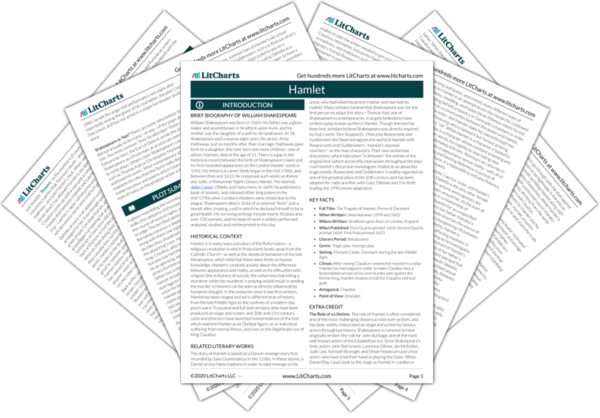Every society is defined by its codes of conduct—its rules about how to act and behave. In Hamlet, the codes of conduct are largely defined by religion and an aristocratic code that demands honor—and revenge if honor has been soiled. As the play unfolds and Hamlet (in keeping with his country’s spoken and unspoken) rules) seeks revenge for his father’s murder, he begins to realize just how complicated vengeance, justice, and honor all truly are. As Hamlet plunges deeper and deeper into existential musings, he also begins to wonder about the true meaning of honor—and Shakespeare ultimately suggests that the codes of conduct by which any given society operates are, more often than not, muddy, contradictory, and confused.
As Hamlet begins considering what it would mean to actually get revenge—to actually commit murder—he begins waffling and languishing in indecision and inaction. His inability to act, however, is not necessarily a mark of cowardice or fear—rather, as the play progresses, Hamlet is forced to reckon very seriously with what retribution and violence in the name of retroactively reclaiming “honor” or glory actually accomplishes. This conundrum is felt most profoundly in the middle of Act 3, when Hamlet comes upon Claudius totally alone for the first time in the play. It is the perfect opportunity to kill the man uninterrupted and unseen—but Claudius is on his knees, praying. Hamlet worries that killing Claudius while he prays will mean that Claudius’s soul will go to heaven. Hamlet is ignorant of the fact that Claudius, just moments before, was lamenting that his prayers for absolution are empty because he will not take action to actually repent for the violence he’s done and the pain he’s caused. Hamlet is paralyzed in this moment, unable to reconcile religion with the things he’s been taught about goodness, honor, duty, and vengeance. This moment represents a serious, profound turning point in the play—once Hamlet chooses not to kill Claudius for fear of unwittingly sending his father’s murderer to heaven, thus failing at the concept of revenge entirely, he begins to think differently about the codes, institutions, and social structures which demand unthinking vengeance and religious piety in the same breath. Because the idea of a revenge killing runs counter to the very tenets of Christian goodness and charity at the core of Hamlet’s upbringing—regardless of whether or not he believes them on a personal level—he begins to see the artifice upon which all social codes are built.
The second half of the play charts Hamlet’s descent into a new worldview—one which is very similar to nihilism in its surrender to the randomness of the universe and the difficulty of living within the confines of so many rules and standards at one time. As Hamlet gets even more deeply existential about life and death, appearances versus reality, and even the common courtesies and decencies which define society, he exposes the many hypocrisies which define life for common people and nobility alike. Hamlet resolves to pursue revenge, claiming that his thoughts will be worth nothing if they are anything but “bloody,” but at the same time is exacting and calculating in the vengeances he does secure. He dispatches with Rosencrantz and Guildenstern, charged with bringing him to England for execution, by craftily outwitting them and sending them on to their own deaths. He laments to Horatio that all men, whether they be Alexander the Great or a common court jester, end up in the same ground. Finally, he warns off Horatio’s warning about dueling Laertes by claiming that he wants to leave his fate to God. Hamlet’s devil-may-care attitude and his increasingly reckless choices are the result of realizing that the social and moral codes he’s clung to for so long are inapplicable to his current circumstances—and perhaps more broadly irrelevant.
Hamlet is a deeply subversive text—one that asks hard, uncomfortable questions about the value of human life, the indifference of the universe, and the construction of society, culture, and common decency. As Hamlet pursues his society’s ingrained ideals of honor, he discovers that perhaps honor means something very different than what he’s been raised to believe it does—and confronts the full weight of society’s arbitrary, outdated expectations and demands.
Religion, Honor, and Revenge ThemeTracker

Religion, Honor, and Revenge Quotes in Hamlet
Thrift, thrift, Horatio! The funeral baked meats
Did coldly furnish forth the marriage tables.
This above all—to thine own self be true;
And it must follow, as the night the day,
Thou canst not then be false to any man.
Something is rotten in the state of Denmark.
O, villain, villain, smiling, damnèd villain!
O God, I could be bounded in a nutshell, and count myself a king of infinite space, were it not that I have bad dreams.
What a piece of work is a man, how noble in
reason, how infinite in faculties, in form, in moving
how express and admirable; in action how like
an angel, in apprehension how like a god: the
beauty of the world, the paragon of animals—and
yet, to me, what is this quintessence of dust?
The play’s the thing,
Wherein I’ll catch the conscience of the king.
My words fly up, my thoughts remain below;
Words without thoughts never to heaven go.
We defy augury. There is a special providence in the fall of a sparrow. If it be now, ’tis not to come; if it be not to come, it will be now; if it be not now, yet it will come. The readiness is all.
Now cracks a noble heart. Good night, sweet prince,
And flights of angels sing thee to thy rest.
















